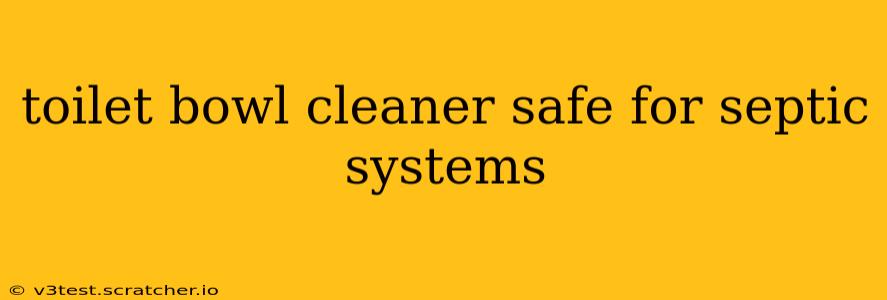Choosing the right toilet bowl cleaner is crucial, especially if you have a septic system. Harsh chemicals can disrupt the delicate bacterial balance in your septic tank, leading to costly repairs and environmental problems. This guide will help you navigate the world of septic-safe toilet bowl cleaners, addressing common concerns and providing expert advice.
What Makes a Toilet Bowl Cleaner Septic Safe?
The key is to avoid cleaners containing harsh chemicals that can kill the beneficial bacteria essential for proper septic system function. These culprits often include:
- Chlorine bleach: A common ingredient in many toilet bowl cleaners, chlorine bleach can decimate the bacteria colony responsible for breaking down waste in your septic tank.
- Strong acids: Similarly, strong acids can disrupt the pH balance and harm the beneficial bacteria.
- Formaldehyde: This preservative is found in some cleaners and can be toxic to the environment and your septic system.
Septic-safe cleaners typically rely on gentler, enzyme-based formulas to break down stains and eliminate odors. These enzymes mimic the natural processes within your septic tank, assisting the bacteria rather than harming them.
Is Baking Soda and Vinegar Safe for Septic Systems?
Yes, a mixture of baking soda and vinegar is generally considered safe for septic systems. This natural cleaning solution is a popular and effective alternative to harsh chemical cleaners. The baking soda provides a mild abrasive action to scrub away stains, while the vinegar helps to dissolve mineral deposits and neutralize odors. However, it might not be as effective as dedicated enzyme cleaners for stubborn stains.
What are the Best Toilet Bowl Cleaners for Septic Systems?
While we cannot recommend specific brands (as that would violate the guidelines provided), look for cleaners explicitly labeled as "septic safe" or "enzyme-based." Check the product's ingredients list carefully to ensure it's free of chlorine bleach, strong acids, and formaldehyde.
Many environmentally friendly cleaning product lines offer effective septic-safe options. Always read the label thoroughly before use to confirm its suitability for your system.
How Often Should I Clean My Toilet Bowl with Septic-Safe Cleaner?
The frequency depends on your usage and the level of staining. Weekly cleaning is usually sufficient for maintaining a clean and fresh toilet bowl. However, if you notice excessive staining or odor, more frequent cleaning might be necessary.
Can I Use a Toilet Bowl Cleaner Regularly Without Harming My Septic System?
Regular use of a truly septic-safe cleaner should not harm your system. However, excessive use of any cleaner, even a septic-safe one, might potentially overload the system over time. Stick to the recommended usage instructions on the product label.
What Happens if I Accidentally Use a Non-Septic Safe Cleaner?
If you accidentally use a harsh chemical cleaner, flush your toilet with plenty of water to dilute the chemicals and help them pass through the system. Monitor your septic system closely for any signs of problems, such as slow draining, unpleasant odors, or backups. If you notice any issues, contact a septic system professional immediately.
How Can I Prevent Septic System Problems?
Beyond choosing the right toilet bowl cleaner, several other practices can contribute to maintaining a healthy septic system:
- Avoid flushing non-biodegradable items: This includes things like feminine hygiene products, baby wipes, cotton balls, and paper towels.
- Regular pumping: Schedule regular septic tank pumping according to your system's needs and local regulations.
- Proper maintenance: Ensure your septic system receives proper maintenance and inspection.
By following these guidelines and choosing septic-safe toilet bowl cleaners, you can keep your toilet sparkling clean while protecting your septic system and the environment. Remember, a healthy septic system is a vital part of your home's infrastructure.
